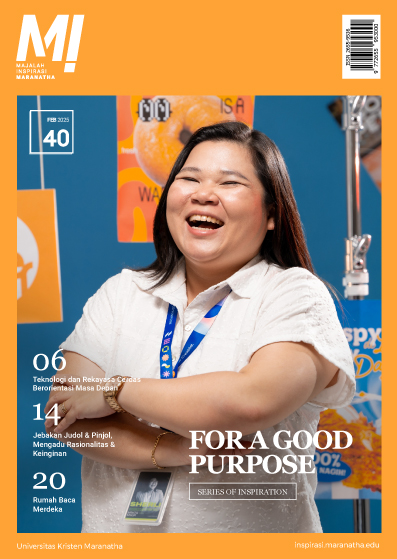The condition of the Covid-19 pandemic that continues to hit the world has created uncertainty for global economic growth. Data according to the Central Statistics Agency (CSA/BPS) shows that Indonesia's economic growth in 2020 is minus 2.07 percent. The government then established various programs for Indonesia's economic recovery, particularly for Micro, Small, and Medium Enterprises (MSMEs). The Faculty of Business at Maranatha Christian University then took the initiative with Bank Sampah Bersinar to help MSME business actors to be able to survive this situation through community service activities on March 27, 2021.
The activity with the theme of “Training and Development of Managerial Skills for MSME Business Actors of Bank Sampah Bersinar” was conducted online through the Zoom platform. The speakers who delivered the material were lecturers at Maranatha, who had expertise in their fields. They were Felicia Abednego, S.E., M.M.; Prof. Dr. Marcellia Susan, S.E., M.T.; Prof. Dr. Wilson Bangun, S.E., M.Sc.; and Dr. Lina Anatan, S.E., M.Sc.
Felicia, as the first speaker, delivered a topic about marketing strategies using digital marketing. She emphasized her material on the shift in trends from offline to online sales and promotions. According to her, all these changes could occur because of the rapid development of the internet in recent years. Internet user penetration in Indonesia had reached 73.7 percent, due to the ease of accessing the internet network. “Digital marketing is one of the fastest growing, most powerful, and can drive change in many sectors that affect the economy,” said Felicia.
Through the second material topic regarding the management of MSME business debt, Prof. Susan explained how to manage the flow of funds from debt properly. The first important thing that must be remembered for MSME business actors was the awareness that the debt used was productive or for business only, not for something consumptive. Business actors also needed to know whether they were able to settle their debt obligations and interest when they fell due. According to her, business actors needed various efforts, so that debt can be managed, namely through a systematic, careful, and appropriate evaluation of financial health. Discipline in regulating and controlling the use of operational funds, understanding of liquidity, and paying attention to cash flow management also needed to be considered so that the flow of funds through debt was well controlled.
Talking about entrepreneurship also means talking about good human resource management. Prof. Wilson said that we needed to recognize and understand the potential that existed. According to him, an entrepreneur generally had a character of creativity, innovation, great will, hard-working, confident, honest, had good business knowledge, and did not stop to learn.
The last material was about business development for MSMEs through an overview of MSMEs in Indonesia, the problems they faced, as well as the opportunities and challenges. Lina said that MSMEs in Indonesia that entered online markets were relatively low, around 17.1 percent. Whereas the opportunity to sell online would make it easier for sellers to expand their marketing network, and be able to streamline production, transportation, warehousing, and promotion costs.
“Business development needs to build important relationships with consumers, as a key strategy to increase revenue and reduce costs, help improve the company's overall image, and open up expansion into new markets,” said Lina. (sg/gn)
Photo: doc. Faculty of Business Community Service Team via Zoom



